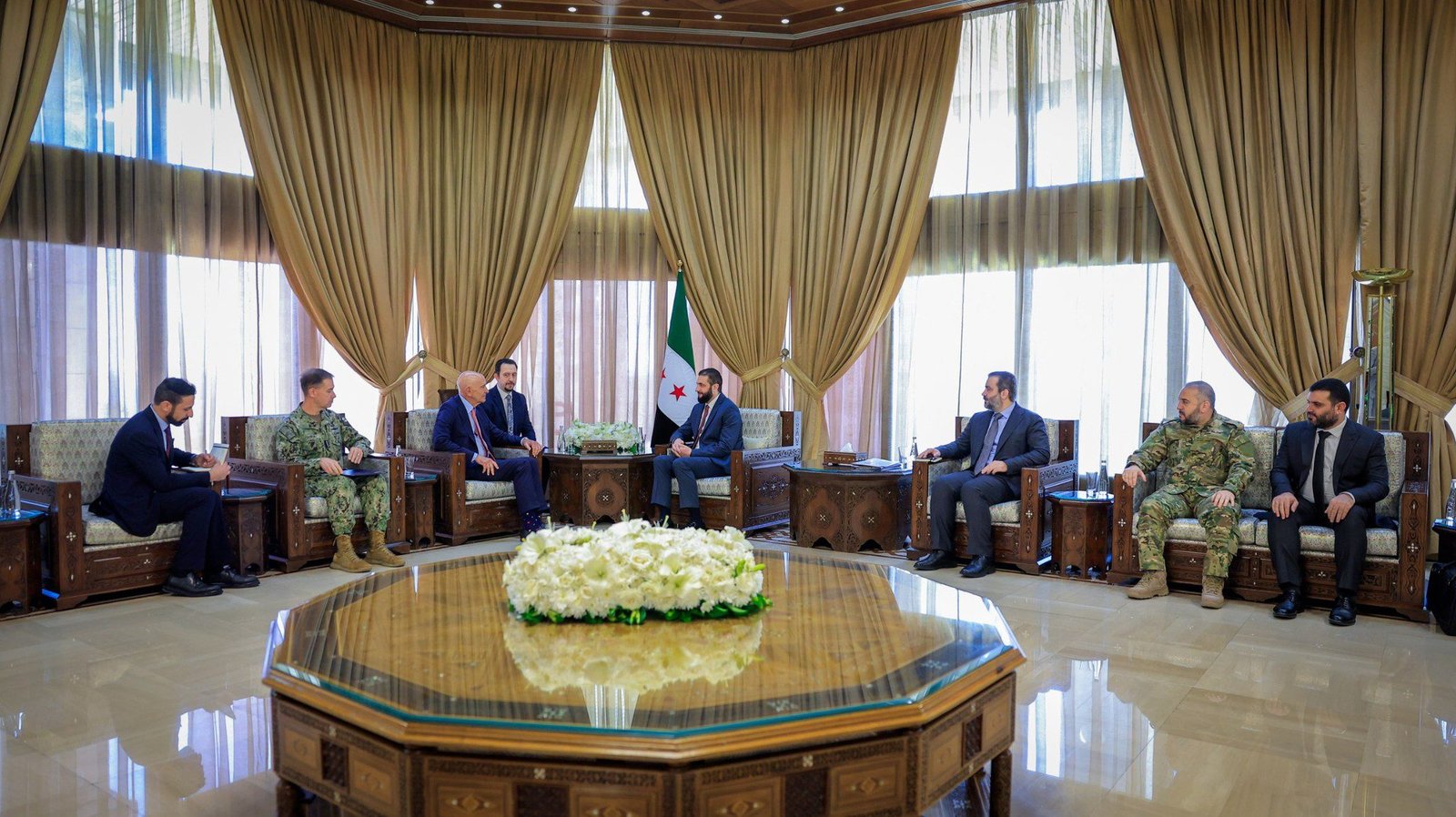SDF Commander, al-Sharaa, and US Envoy Hold Pivotal Talks in Damascus

Syrian Democratic Forces (SDF) Commander Mazloum Abdi has met with Syrian President Ahmed al-Sharaa in Damascus for pivotal discussions regarding the future of northeast Syria. US envoy to Syria Tom Barrack and US Central Command commander Brad Cooper also attended.
This follows Barrack and Cooper’s meeting with Abdi in Hasakah in northeast Syria yesterday, which was followed by violent clashes overnight in Aleppo, where a Kurdish enclave spanning two neighborhoods continues to hold out. Tomorrow, Syria’s foreign minister is set to visit Ankara for meetings with Turkish officials.
Context: The Damascus meeting, which has lasted hours, brought together on the SDF side Mazloum Abdi, foreign relations official Ilham Ahmed, and YPJ commander Rohlat Afrin. Representing the Syrian government were Foreign Minister Asad al-Shaibani and, reportedly, Defense Minister Murhaf Abu Qasra, who announced an immediate nationwide ceasefire across all frontlines during the talks.
The primary agenda is to revive the March 10 agreement, which envisions the SDF’s integration into the Syrian Army before the end of the year. However, the SDF has demanded amendments, rejecting full absorption into the army’s ranks and instead insisting on remaining a unified bloc within it.
Analysis: The timing of last night’s clashes in Aleppo strongly suggests a politically motivated decision by the Syrian government to apply pressure on the SDF ahead of today’s negotiations. However, it may also signal that yesterday’s talks between Barrack, Cooper, and Abdi failed to produce a breakthrough satisfactory to the Syrian government—and more importantly, to the elephant in the room: Turkey.
Diplomatic activity is likely to intensify over the coming three months, but the gap between Damascus and the SDF remains too wide to bridge easily. According to Sky News Arabia, Abdi has categorically refused individual integration into the Syrian Army, proposing instead that the SDF join as a cohesive military bloc. This is something Damascus is highly unlikely to accept. Abdi reportedly suggested during his meeting with al-Sharaa the establishment of an autonomous region similar to Iraq’s Kurdistan Region.
While Turkey also opposes such an arrangement, attributing the obstacle solely to Ankara overlooks the domestic resistance within Damascus, particularly among its Sunni Arab constituencies, who perceive any recognition of the SDF’s current structure or territorial control as unacceptable. Damascus has held firm on important symbolic points. For instance, it initially accepted but ultimately refused to negotiate with the SDF in France, as doing so would have internationalized the negotiations and signaled two equal parties at the table. By insisting talks be held in Damascus, the al-Sharaa government gains an important optical advantage.
Meanwhile, Tom Barrack is reportedly considering stepping down as US Envoy to Syria next month if no progress is made between Damascus and the SDF. Barrack, one of Trump’s closest confidants, operates with unusual autonomy and informality, enjoying the President’s personal trust to broker a deal. His departure would signal that the diplomatic track has failed, potentially paving the way for military escalation.
For why these meetings still lack a concrete roadmap, see our analysis of SDF–Damascus verbal agreements around the March 10 deal.
Both sides appear to be preparing for such a possibility. The SDF has been expanding its network of tunnels and fortifying its defenses in anticipation of potential hostilities. The SDF’s strongest advantage is its image, which it can leverage in lobbying efforts—particularly in the US Congress—should war break out. Even Barrack has acknowledged Congress’s “very soft spot” for the SDF in its struggle against Turkey.
However, Trump’s close rapport with Erdogan complicates the picture. Unlike during his first term, Trump now wields far greater influence over a Republican-controlled Congress, and it remains uncertain whether the Gaza breakthrough—which he publicly credited Erdogan for helping secure by persuading Hamas to accept a deal—could give the Turkish leader tacit approval to act in northeast Syria. With both Washington and the wider world preoccupied by multiple crises, Congress may be less inclined to oppose a Turkish-backed offensive, particularly if it focuses on the Arab-majority areas that make up much of the territory under SDF control.
Not all scenarios point to open conflict, but the only acceptable outcome for both Damascus and Ankara appears to be one in which the SDF’s authority is confined to Kurdish-majority areas, and its military capacity reduced to a size that poses no threat to the Syrian Army. Such an outcome, however, would be unacceptable to the SDF, as it would confine the group to a narrow, politically and strategically marginal position.









